
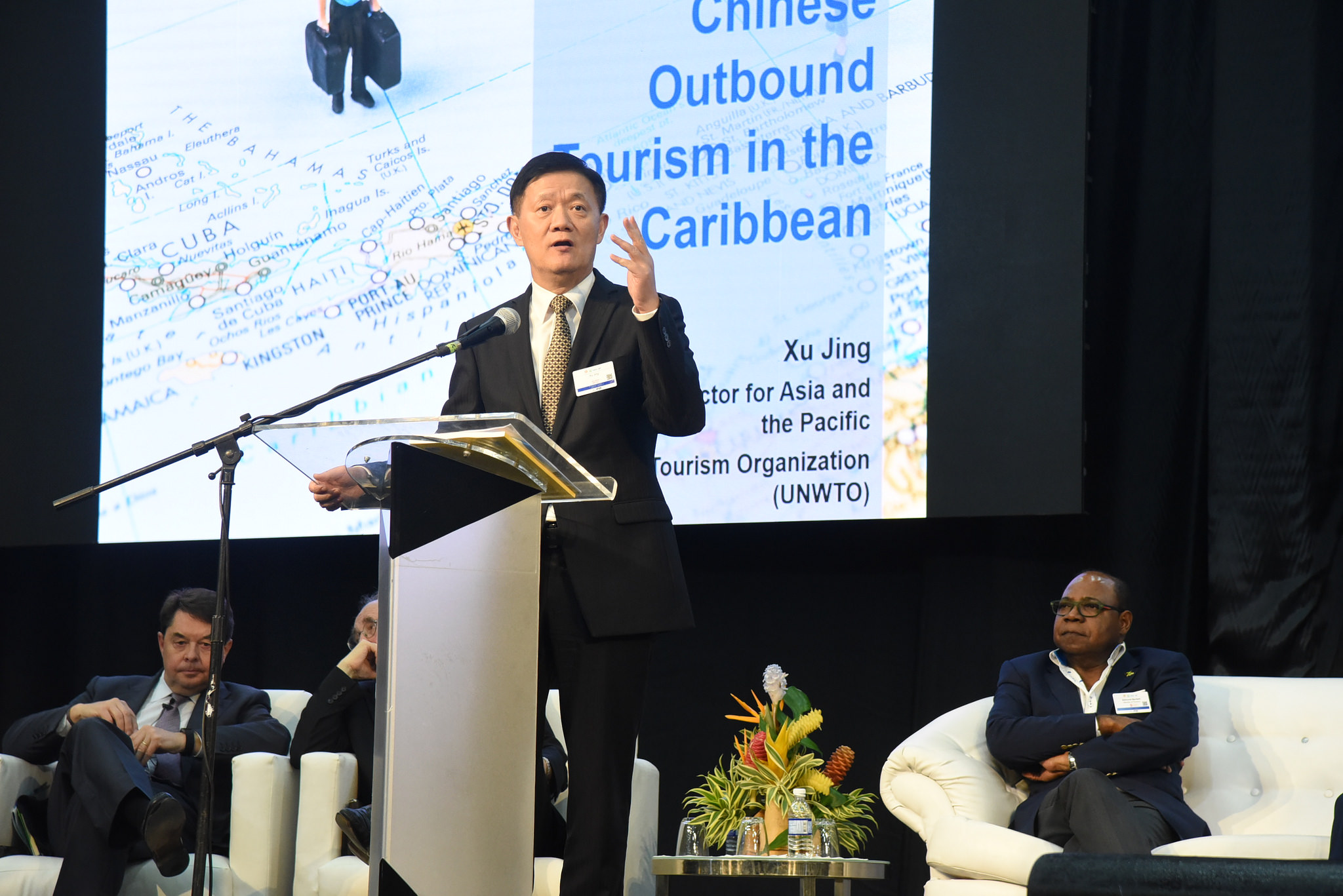
Look to Asia as next frontier for travelers
As the Caribbean looks to grow its tourism market, a senior executive of the United Nations World Tourism Organization (UNWTO) has urged the region to look to Asia as its next frontier.
UNWTO’s Regional Director for Asia and the Pacific, Xi Jing, himself an Asian, yesterday outlined the tremendous potential of the market, especially targeting millennials with strong spending power. He was making a special presentation to participants attending the Global Conference on Jobs and Inclusive Growth: Partnerships for Sustainable Tourism, at the Montego Bay Convention Centre.
He advised the tourism leaders, policymakers and other stakeholders to “start thinking about Asia in addition to your decades of thinking about Europe, your long time of thinking about America and about Latin America.” Mr Xi Jing presented facts on outbound Chinese travel to reinforce his argument that Asia presented itself as the next source market for the Caribbean.
Overall, he said, there were 1,235 million international arrivals around the world and already Asia and the Pacific were taking 25 percent of the market with the goal of reaching 30 percent by the year 2020. On top of that, he noted, in 2016 while other regions were showing a growth rate of 3.9 percent, the Asia and pacific region was way ahead with a 9 percent growth rate.
In monetary terms, looking at the tourist spend, the Asia-Pacific region was spending 40 percent of the world’s tourism expenditure with much of it remaining within the region. But from the Asian countries alone, China spent 21 percent of the entire world’s tourism expenditure. “On a year-to-year basis, we’re talking about 120 to 130 million Chinese outbound travelers to the rest of the world,” he stated.
Mr. Xi Jing pinpointed the eastern coast of China, including Beijing, Shanghai and other major cities as the area of concentration for Chinese outbound travel and where Jamaica and the rest of the Caribbean must target. “This is the area where per capita GDP is around US$10,000 and generated 32 percent of Chinese travelers around the world, he said.
However, he explained that while now only six percent of the Chinese population had a passport, compared to 40 percent of people of the United States, the Chinese did not need a visa to come to Jamaica; however, this was not well known.
Taking a look at Chinese demographics, Mr. Xi Jing said “baby boomers” were estimated to be 219 million by 2030 and preferred long distances and travelled for a longer time, while “millennials” would reach 414 million with 31 percent of the population being technologically savvy and wanted to be treated differently. They were also better at speaking English and it was important to utilize their preferred digital platform in marketing as the typical western system would not work with them.
Most Chinese now travel to neighboring countries but the United States beckoned as their next destination. Mr. Xi Jing said the US received 2.6 million Chinese visitors and 10 million visited the European Continent in 2016. Florida alone received 300,000. Their preferred periods of travel were end of January to beginning of February and the beginning of October.
In the Caribbean, Cuba with 40,000, has the highest number of Chinese visitors with Jamaica coming in second with 3,899. Mr. Xi Jing has suggested that the Caribbean and Jamaica, in particular, could attract many more by changing mind-set on how to penetrate the market and doing away with certain stereotypes about the Chinese.
He also recommended Jamaica increasing facilitation to carry over Chinese travellrs from the American market, offering more Chinese friendly services and highlighting the unique Caribbean culture.
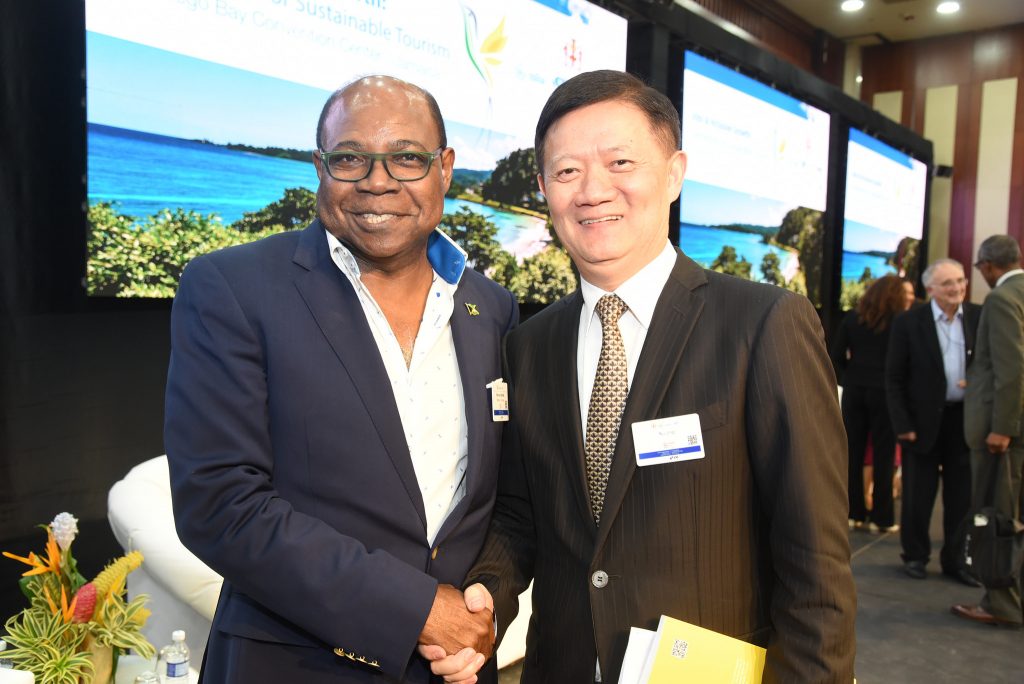
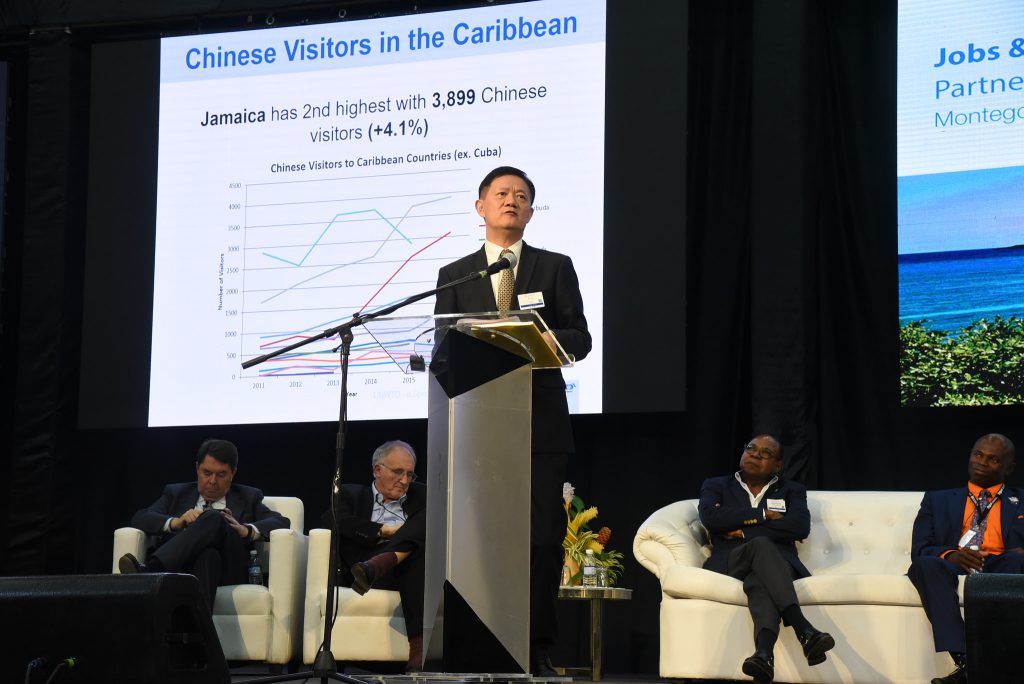
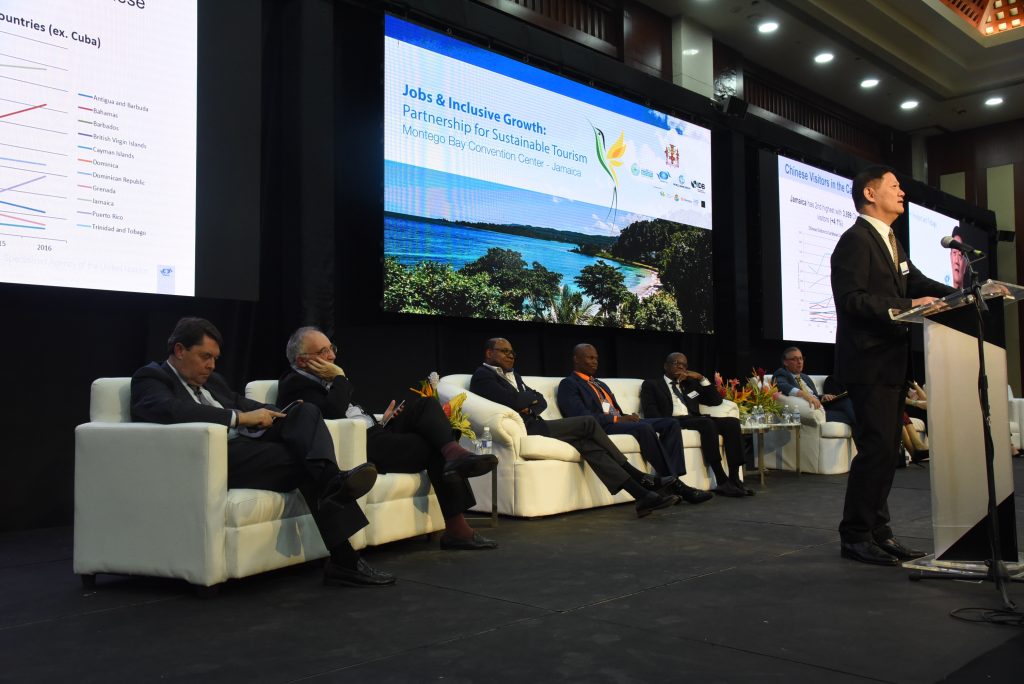
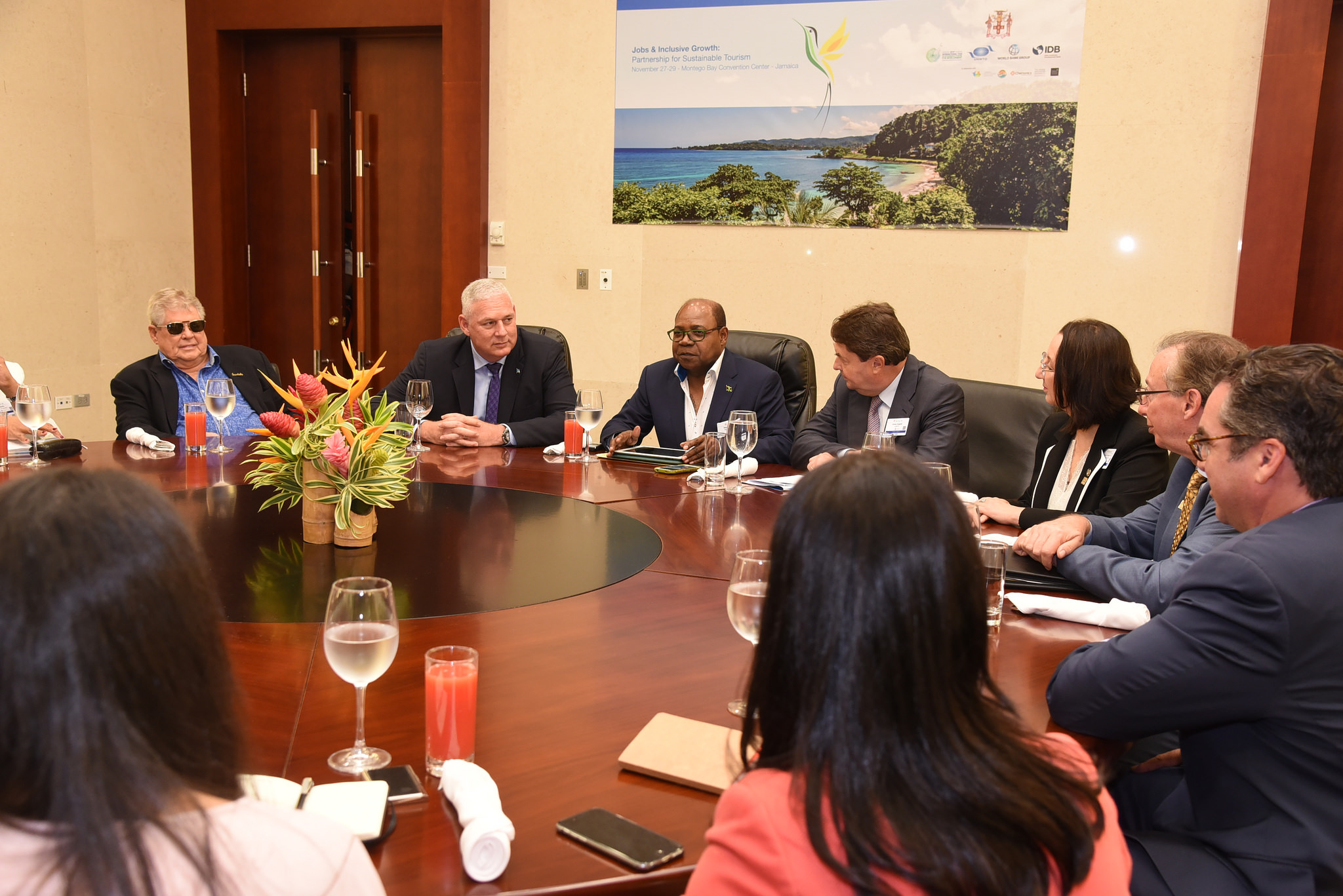
Minister Bartlett gives update on Caribbean Resilience Initiative
Acting in his capacity as Chairman of the Caribbean Tourism Recovery Group and UNWTO’s Disaster Recovery Working Group for the Affected States in the Caribbean, Minister of Tourism, Hon. Edmund Bartlett, continued discussions with key international and regional stakeholders about building resilience for the region in the event of natural disasters.
Sharing in the moment are, Prime Minister of St Lucia, the Most Hon. Allen Chastanet (left) and Executive Director of the UNWTO, Carlos Vogeler. The Minister used the opportunity to announce that a full draft of the recovery program would be ready at the end of the United Nations World Tourism Organization (UNWTO), Government of Jamaica, World Bank Group and Inter-American Development Bank Global Conference on Jobs and Inclusive Growth: Partnerships for Sustainable Tourism.
The announcement was made during the first day of the conference (Monday November 27, 2017), which is taking place at the Montego Bay Convention Centre.
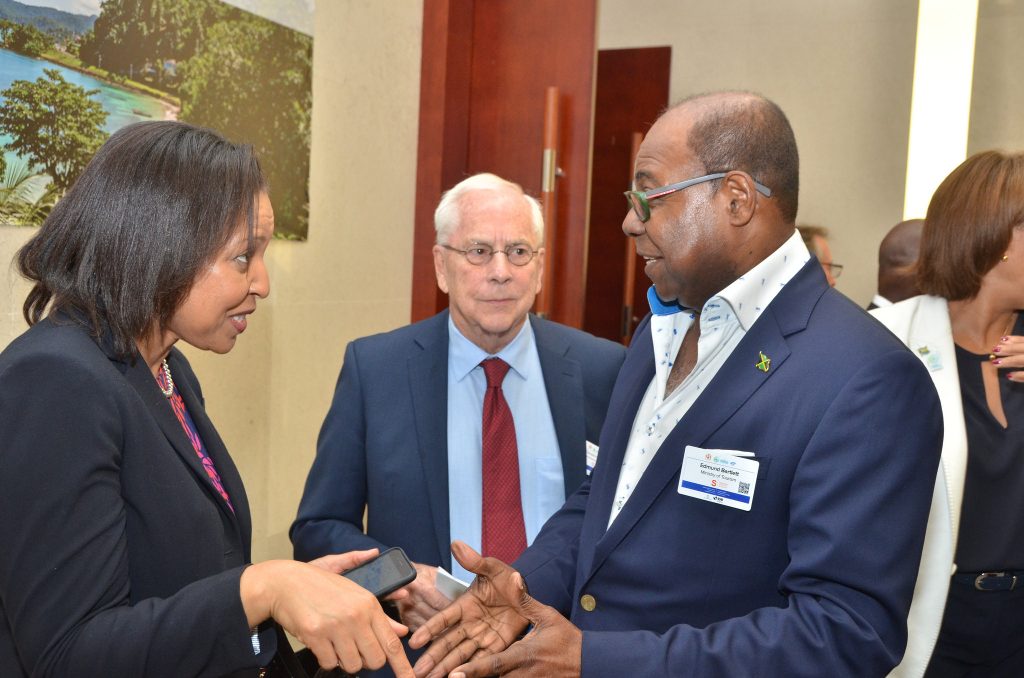


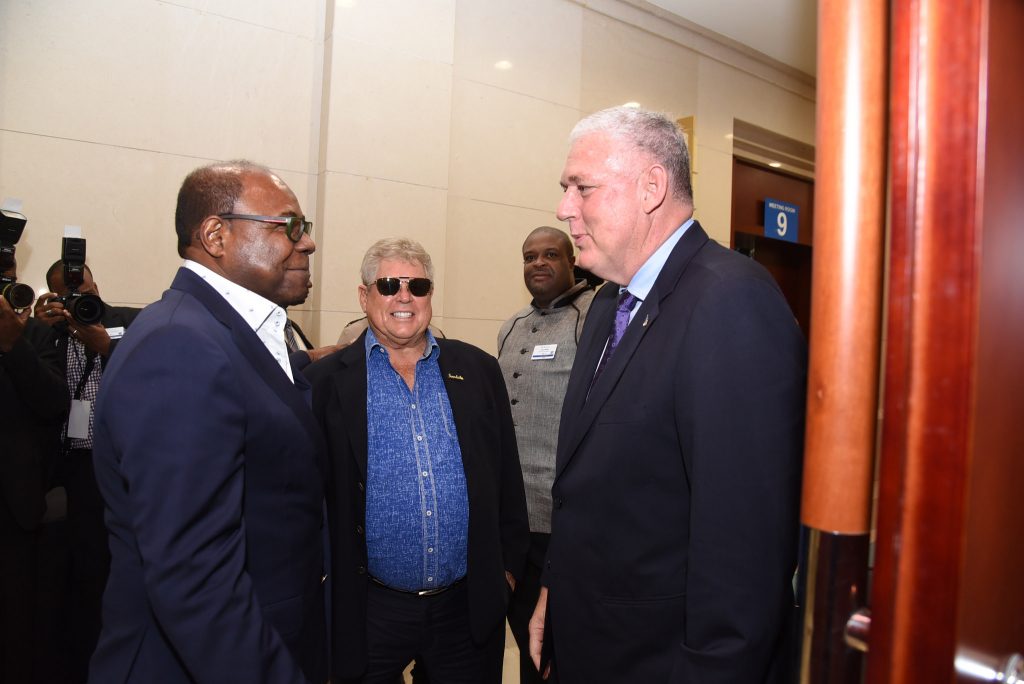

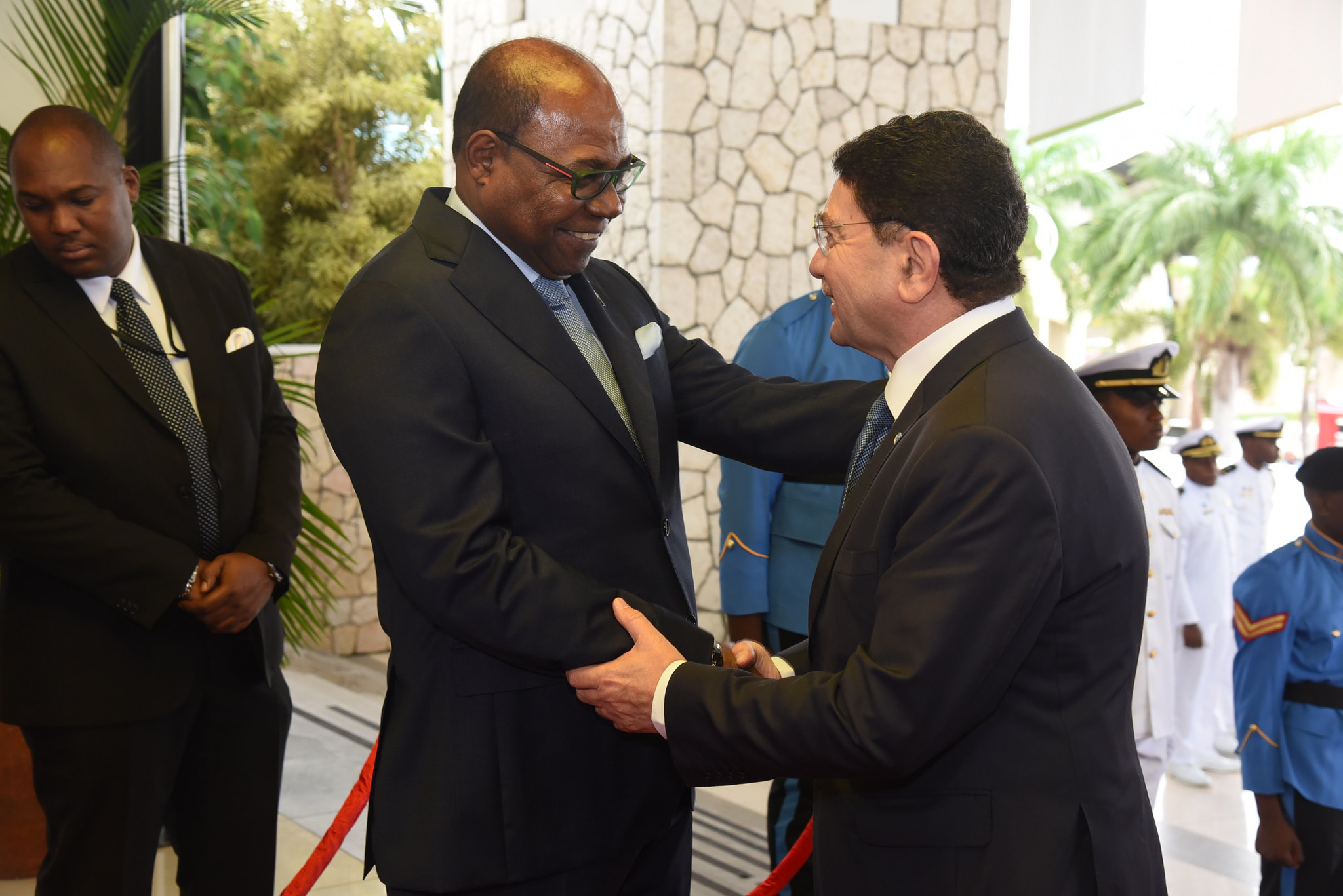
Tourism and the global sustainable development: Minister Bartlett’s remarks on Day 2 of UNWTO conference
Jamaica’s Tourism Minister Hon. Edmund Bartlett delivered the following remarks on Day 2 of UNWTO Global Conference:
• The quest to achieve sustainable development dominates the national policy agendas of most countries across the world. The United Nations in 2016 expanded its original global development mandate – the Millennium Development Goals – to give increased focus to a wide range of areas that are considered urgent to a successful global agenda for sustainable development.
• One hundred and ninety-three (193) World leaders adopted the 17 Sustainable Development Goals of the 2030 Agenda for Sustainable Development, indicating their commitment to mobilize efforts to eradicate poverty, fight inequalities and tackle climate change while ensuring that no one is left behind.
• Globally, tourism has been identified as one of the main catalysts for promoting sustainable development; so much so that the United Nations 70th General Assembly has designated 2017 as the International Year of Sustainable Tourism for Development.
• This designation provides a unique opportunity for tourism principals and policymakers to raise awareness of the contribution of tourism to sustainable development, while mobilizing all stakeholders to work together in making tourism a catalyst for positive change.
• In pursuing its mandate of aligning tourism with sustainable development, the United Nations and its network of global partners have committed to supporting a change in policies, business practices and consumer behaviour towards a more viable and inclusive tourism sector that can contribute to the attainment of the Universal 2030 Agenda for Sustainable Development and the Sustainable Development Goals (SDGs).
• This is particularly so in areas such as: promoting inclusive and sustainable economic growth, social inclusiveness, employment and poverty reduction, resource efficiency, environmental protection and climate change, cultural values, diversity and heritage and mutual understanding, peace and security.
Promoting SDGs
• Based on the United Nations conceptual framework, sustainable tourism strategies dominating the global agenda have been designed within the context of the broader discourse which seeks to position the global economic sectors and industries to maximize their potential to contribute to sustainable development.
• It has been, by now, widely accepted that global tourism has the potential to contribute, directly or indirectly to the achievement of Sustainable Development Goals such as:
o SDG 1 – Poverty eradication;
o SDG 3 – Promoting good health and well-being;
o SDG 5 – Promoting gender equality
o SDG 8 – P Promoting decent work and economic growth;
o SDG 7_ Promoting affordable and clean energy;
o SDG 9 – The development of industry, innovation and infrastructure
o SDG 10 – Reducing Inequalities
o SDG 11 – Promoting sustainable cities and communities; and
o SDG 12 – Promoting responsible consumption and production.
International Tourism in 2016
• The tourism sector continues to be a catalyst for economic growth and development among developing countries. The recently released WTTC Travel and Tourism Economic Impact 2017 Report found that despite facing increased threats related to global terrorism and political instability in many countries, Travel & Tourism continued to show its resilience in 2016, contributing direct GDP growth of 3.1% and supporting 6 million net additional jobs in the sector.
• In total, Travel & Tourism generated US$7.6 trillion (10.2% of global GDP) and 292 million jobs in 2016, equivalent to 1 in 10 jobs in the global economy. The sector accounted for 6.6% of total global exports and almost 30% of total global service exports.
• Growth in Travel & Tourism in 2016 outpaced that of the global economy (2.5%) for the 6th consecutive year. Additionally, in 2016, direct Travel & Tourism GDP growth not only outperformed the economy-wide growth recorded in 116 of the 185 countries covered by the annual economic impact research (including in major Travel & Tourism economies such as Australia, Canada, China, India, Mexico and South Africa) but it also was stronger than the growth recorded in the financial and business services, manufacturing, public services, retail and distribution and transport sectors.
International Tourism in 2017
• The data compiled for 2017 have so far revealed that international tourist arrivals worldwide grew by 6% between January to April when compared to the corresponding period last year, with business confidence reaching its highest levels in a decade. Destinations worldwide received 369 million international tourists (overnight visitors) in the first four months of the year, 21 million more than in the same months of 2016 (+6%), according to the latest UNWTO World Tourism Barometer.
• The data also indicate that many non-traditional countries are becoming more competitive and are controlling great shares of the global market. The top ten fastest growing tourist destinations this year are: Palestine, Egypt, Northern Mariana Islands, Iceland, Tunisia, Vietnam, Uruguay, Nicaragua and Mongolia and Israel.
• The impressive arrival figures for 2017 have been in-keeping with a consistent trend in international tourism growth. Indeed, the current volume, speed and reach of travel are unprecedented. International tourist arrivals increased from 25.3 million in 1950 to 1138 million in 2014 to 1184 million in 2015 to 1235 million in 2016. The projection is for that trend to continue throughout 2017.
Tourism and Sustained Economic Growth
• As one of the largest and fastest growing economic sectors in the world, tourism creates jobs, drives exports, and generates prosperity across the world. As such, tourism is well-positioned to foster sustained economic growth at all levels and provide direct and indirect incomes for billions around the world.
• Many developing countries have managed to expand their participation in the global economy through development of globally competitive tourism products. Indeed, tourism is the only export sector where the consumer travels to the exporting country, which provides opportunities for the poor to become exporters through the sale of goods and services to foreign tourists.
• Findings show that the development of the tourism industry in many developing and least developed countries (LDCs) has become the most viable and sustainable option for economic development, and in some countries, the main source of foreign exchange earnings. In 2014, Least Developed Countries (LDCs) received US$16.4 billion in exports from international tourism, up from US$2.6 billion in 2000, making the sector an important pillar of their economies (7% of total exports) and helping some to graduate from the LDC status. Tourism is also labour-intensive and supports a diverse and versatile labour market.
• The tourism industry is such a strong pillar of economic growth and development among Developing Countries mainly because of the economic linkages and diversification the sector promotes within host economies. The tourism value chain can incorporate many sectors in an economy.
• Its promotion will require the construction and operation of hotels, restaurants and other tourism-related facilities through backwards linkages and the development of basic infrastructure services, such as energy, telecommunications and environmental services; agriculture, manufacturing and other support services.
Tourism Supports Cross-Sectoral Growth
• Tourism can also create a wide range of forward linkages with sectors supplying services consumed by tourists. These include financial, telecommunications, retail, recreational, cultural, personal, hospitality, security and health services.
• In addition, countries wishing to strengthen their tourism sector will need to develop other tourism-supporting infrastructure, such as airports, proper roads, ports, hospitals and banks, which are essential for providing access to high-quality services and creating a competitive tourism destination.
• All of these tourism-related activities produce positive spill over effects in many Developing economies.
Tourism as a catalyst for local economic development (LED) and community renewal
• Sustainable tourism, which benefits and engages local communities, can provide a source of livelihood, strengthen cultural identities and spur entrepreneurial activities, thereby helping to prevent violence and conflict to take root and consolidate peace in post-conflict societies. Additionally, as tourism revolves around billions of encounters between people of diverse cultural backgrounds, the sector can foster multicultural and inter-faith tolerance and understanding, laying the foundation for more peaceful societies.
• Sustainable tourism development, and its impact at community level, can also be linked with promoting environmental sustainability through the adoption of green technologies and also with promoting good health and well-being through corporate social responsibility (CSR) strategies that provide social services and outreach to host communities. Sustainable tourism should also maintain a high level of tourist satisfaction and ensure a meaningful experience to the tourists, raising their awareness about sustainability issues and promoting sustainable tourism practices amongst them.
• .Tourism can also be a powerful tool for community development and reducing inequalities if it engages local populations and all key stakeholders in its development. Tourism can contribute to urban renewal and rural development and reduce regional imbalances by giving communities the opportunity to prosper in their place of origin.
The importance of this Conference
• Based on the narrative that I have just outlined, the cumulative impact of sustainable tourism for the beneficiary economies will be increased investments (both domestic and foreign); growth of industries, MSMES and community-based enterprises; accelerated job creation; sustained economic livelihoods; increased exports; more foreign exchange; environmental conservation and general symbiosis all linked to sustainable development through poverty reduction and environmental sustainability.
• This vision for achieving sustainable development through tourism will, however, not be achieved unless there is the informed participation of all relevant stakeholders, as well as strong political leadership to ensure wide participation and consensus building. It is within this context that we have organized this momentous event to achieve fruitful engagements on discussing the challenges confronting global tourism and the way forward.
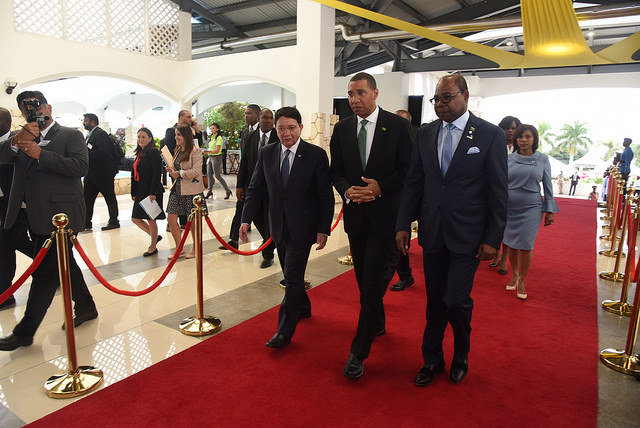
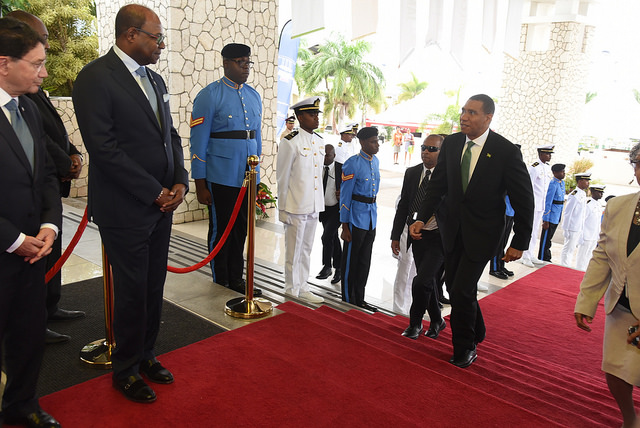
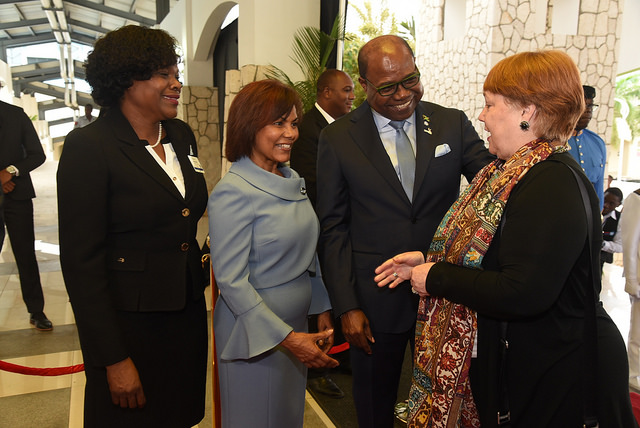
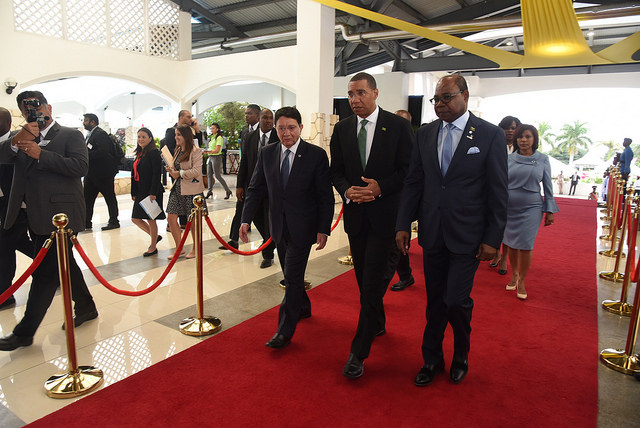
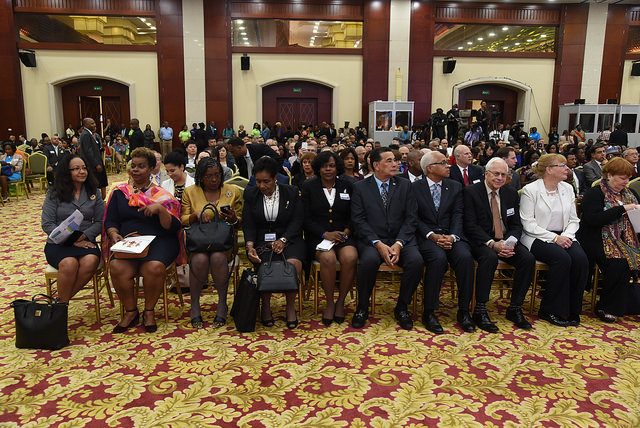
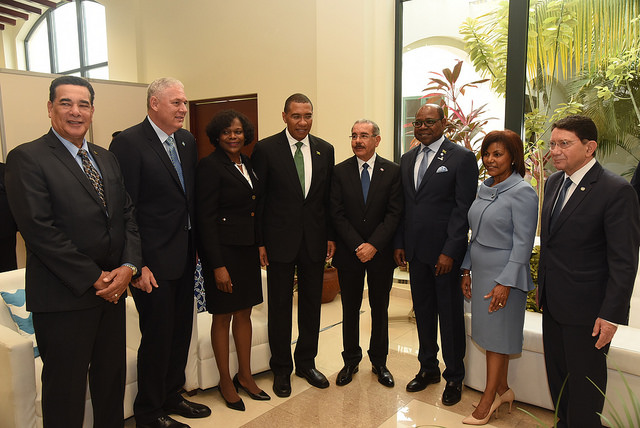
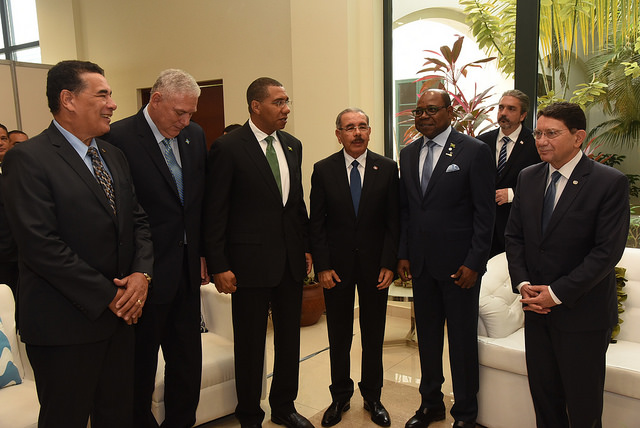


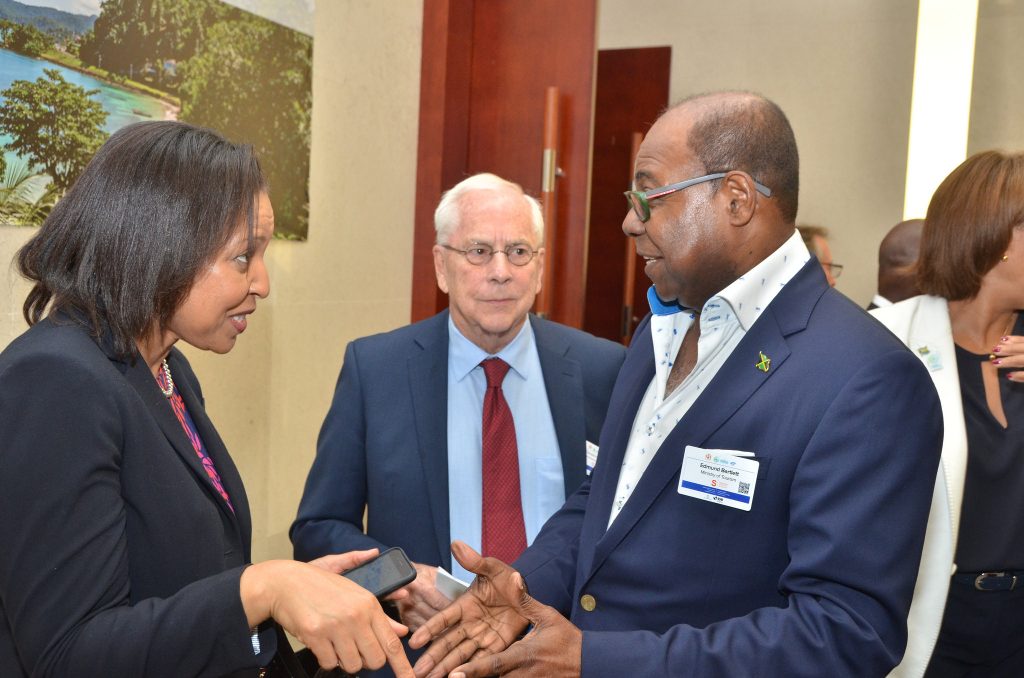

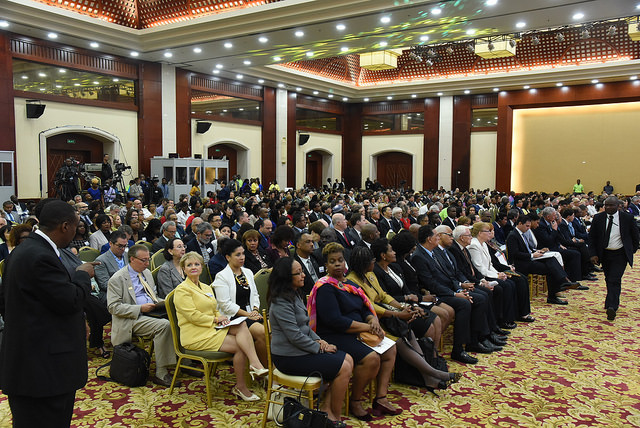

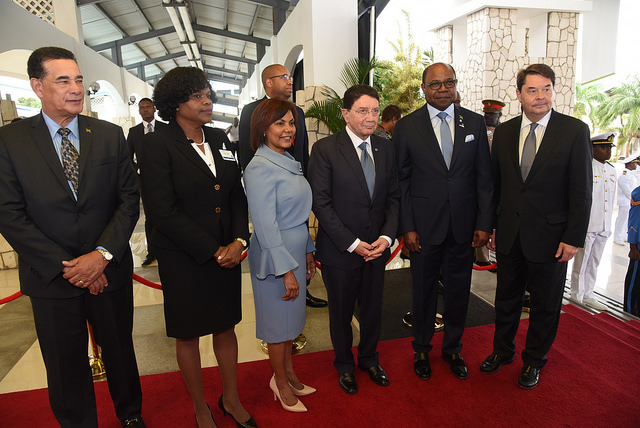
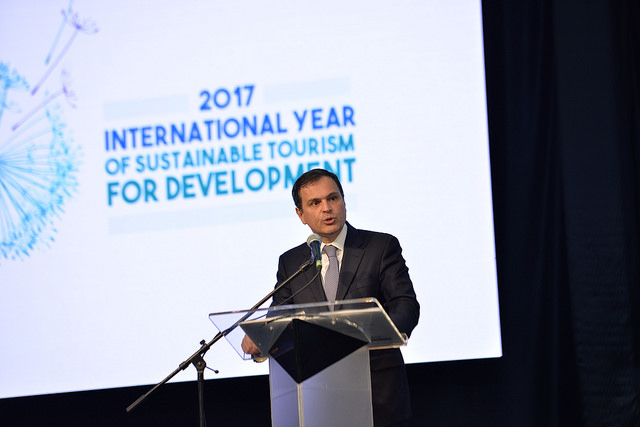
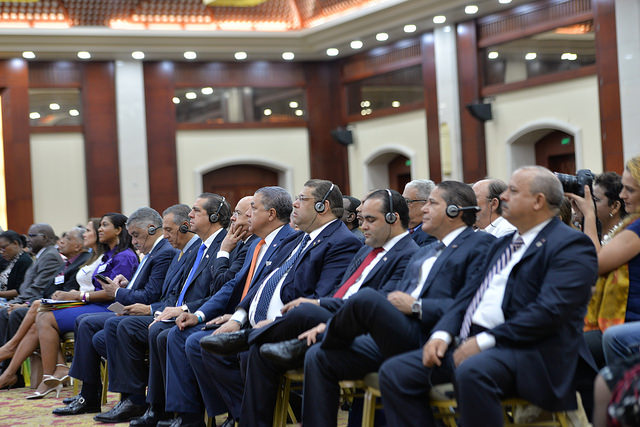

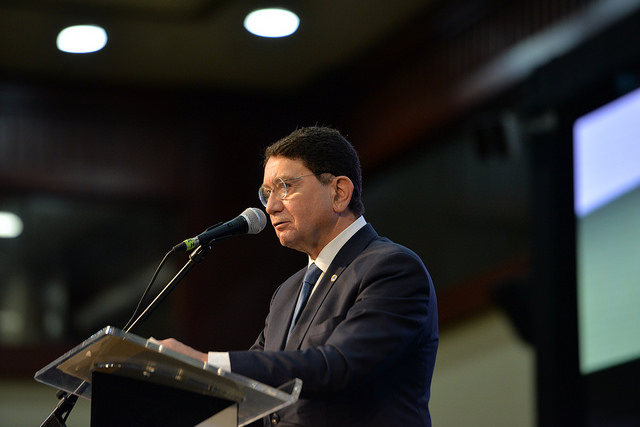
UNWTO Secretary General Taleb Rifai makes Jamaica proud
UNWTO Secretary General, Taleb Rifai told the packed audience that he felt the pride Jamaicans had for their beautiful country, when he heard the presentation of the national anthem this morning, before delivering the following remarks at the opening ceremony of the Global Conference on Jobs and Inclusive Growth: Partnerships for Sustainable Tourism:
Prime Minister, Minister Bartlett, Luis Almagro Secretary General, OAS
Dear Friends,
Good morning and welcome to our very first Global Conference on Jobs and Inclusive Growth in Tourism.
It is a pleasure to be here and to have Jamaica as our generous host, a country that has long been an important partner to UNWTO and the global tourism and development communities.
Particular thanks to the Special Ambassadors of the International Year of Sustainable Tourism for Development 2017, Dr. Michael Frenzel is here today representing them, to all our official sponsors and partners, namely those who join us today, All Nippon Airways, Hilton, PR MediaCo, Ras Al Khaimah, and the Government of Colombia (thank you for coming Sandra).
All of you have made this year possible.
Allow me also to thank the World Bank and the Inter-American Development Bank for partnering with UNWTO and Jamaica in organizing this Conference as well as Chemonics, WTTC, the George Washington University, the Caribbean Tourism Organization and Caribbean Hotel and Tourism Association for their great support to the Conference.
Dear Friends
At the outset of our gathering allow me to express our deepest and most sincere support to all the countries in this region affected by the devastating hurricane Irma.
We are here to show you our full support and walk with you through recovery.
Dear Friends,
Against all odds and despite all challenges, travel and tourism continues to grow as one of the leading socio-economic sectors in the world today.
In 2016, 1235 million travelers crossed international borders, in one year.
That is almost 1/6 of the people of the world making an international trip every year.
2016 was the seventh consecutive year in a row of above average economic growth.
This year, 2017, is no different, as global growth between January and August continues even stronger at +7%.
Tourism is:
Generating US$3.2 billion of spending every day globally
Creating 1/10 jobs all over the world
Representing 10% of world GDP
Constituting 30% of world trade in services,
Travel and tourism is today the 3rd largest export industry in the world after chemicals and fuels.
UNWTO’s long-term forecasts show that by 2030, the 1.2 billion of today will be 1.8 billion.
Beyond the numbers and the economic benefits, tourism is today bringing us together like never before.
Together with other forces of globalization, travel and tourism is making the new world smaller, more connected and more informed, and therefore, more involved, more concerned and a more caring world, a better world indeed.
Travel and tourism is today contributing to breaking down barriers and stereotypes, enabling us to experience, enjoy and celebrate the beauty of our rich cultural diversity.
Mark Twain summed it up pretty well when he said “travel is fatal to prejudice, bigotry, and narrow-mindedness, and many of our people need it sorely on these accounts.”
Travel, dear friends, opens minds, opens eyes and opens hearts.
We become better people when we travel.
Dear Friends,
With growth, however, comes power, and, with power, comes responsibility – with 1.8 billion travelers, we could end up with 1.8 billion opportunities, or 1.8 billion disasters – it’s all up to us.
How we manage this impressive growth is in our hands.
We need to ensure that the 1.8 billion travelers, can and should, when well-managed, translate into:
Opportunities for inclusive economic growth
Opportunities for more and better jobs, decent jobs
Opportunities to distribute wealth and share prosperity
Opportunities to better know and respect each other
Opportunities to protect our natural and cultural heritage
In short, growth, inclusion and progress are our means to achieve
sustainable development.
Because sustainability, my friends, is to sustain LIFE on earth.
Not just to preserve its natural and cultural assets and the foundations of who we are, where we live,
and, how we live (in today’s context, how and where we work) but, to do so, and in the process, elevate LIFE on earth to a higher level of progress and quality for all the people.
BECAUSE
It’s really all about people – they are at the center of all challenges
Growth and sustainability,
Progress and sustainability, should go hand in hand, not either – or, but a win-win equation.
Dear Friends,
In 2015, the international community accomplished three important milestones,
– The 17 SDGs, a roadmap to 2030 (UNGA)
– The Paris agreement on climate change (UNFCCC)
– Dedicate 2017 as “The international year of sustainable tourism for development” (UNGA)
2017 is, therefore, a very special year for us, in the travel and tourism industry, and a unique opportunity for all of us to come together to promote the contributions of travel and tourism, as a grand 21 c human activity, to shape a better future for people and planet.
The question today remains, how can we use this unique opportunity of the IY 2017, to ignite and enable this transformative force, called Travel & Tourism, to contribute to all 17 SDGs, our agenda for 2030? To contribute to making this world a better place?
Dear friends,
I am certain that part of the answer lies in strong, effective and transparent partnerships.
In today’s globalized world, every challenge is a global challenge.
Strong collaboration and decisive action is required to surmount these global challenges.
And such a global challenge, as ensuring sustainable growth for years to come, calls for common goals – effective global partnerships, and stronger financing for development with means which reflect the real potential of tourism to make this world a better place.
That is the message that we are giving loud and clear this week.
Dear Friends,
This conference is a unique opportunity to deliver on a new framework for global partnership for sustainable development through tourism.
An opportunity to create a new roadmap to make tourism an effective path to a better future for all people, leaving no one behind.
As we do so, lets us always remember our motto for this year
TRAVEL
ENJOY
RESPECT (RESPECT NATURE; CULTURE AND THE OTHER)
Thank you.

UNWTO Secretary General Taleb Rifai has a message for Caribbean Tourism Stakeholders
The UNWTO conference on jobs & inclusive growth at the Montego Bay Convention Center in Jamaica has been going overtime today. Among the many celebrities speaking Monday afternoon was outgoing UNWTO Secretary General Dr. Taleb Rifai explaining tourism resilience. The UNWTO Secretary-General said travel and tourism are bringing us together and it makes it a better world.
He announced establishing a global crisis network center in the Caribbean to respond to any crisis anywhere in the world. Tourism should take a leading place in crisis management.
This was echoed and confirmed by Jamaica’s Minister of Tourism, the proud host of this conference.
This special session on building resilience in the face of natural disasters in both a humanitarian and economic necessity, especially for regions like the Caribbean where tourism is often the major source of income and fuels the islands economies and societies. Therefore it is essential for the region to have a functioning crisis preparation management and recovery process that involves both the private and the public sectors. According to Rifai, effective media outreach is utmost important, and it cannot be just statements from the minister saying how good everything is.
Rifai endorsing Jamaica’s minister’s brainchild of opening a crisis resilient center in the Caribbean that would take charge of any disaster anywhere in the world was received by applause.




 The roundtable included Luis Almagro, Secretary General OAS, Edmund Bartlett, Minister of Tourism, Jamaica, Cardigan Conner, parliamentary secretary for tourism, Anguilla, Hugh Rile, Secretary General and CEO, CTO, Frank Comio, CEO and Director General Caribbean Hotel and Tourism Association, Kim Hurtault- Osborne, Executive Secretary for Integral Development, OAS, Virginia Messina, Director Caribbean Recovery Taskforce, WTTC, Sandra Carvao, Chief Communication and Publications Officer, UNWTO, Abel Matutes, Director Palladium Hotel Group, and Prof. Geoffrey Lipman, co-founder Sun X and president International Coalition of Tourism Partners (ICTP).
The roundtable included Luis Almagro, Secretary General OAS, Edmund Bartlett, Minister of Tourism, Jamaica, Cardigan Conner, parliamentary secretary for tourism, Anguilla, Hugh Rile, Secretary General and CEO, CTO, Frank Comio, CEO and Director General Caribbean Hotel and Tourism Association, Kim Hurtault- Osborne, Executive Secretary for Integral Development, OAS, Virginia Messina, Director Caribbean Recovery Taskforce, WTTC, Sandra Carvao, Chief Communication and Publications Officer, UNWTO, Abel Matutes, Director Palladium Hotel Group, and Prof. Geoffrey Lipman, co-founder Sun X and president International Coalition of Tourism Partners (ICTP).
Lipman said to bank on our children and grandchildren and explained his resilience education and the Maurice Strong Legacy Scholarships.
After the session, Xu Jing, UNWTO’s Regional director for Asia and Pacific explained the potential of Chinese Tourists also for the Caribbean. Cuba had a visa-free policy with China sometimes, and already welcomes 49,000 tourists a year. Jamaica also has a visa-free arrangement with China and almost 5,000 Chinese visitors stayed in Jamaica. There is a lot of room for expansion looking at the arrival numbers going into the millions the United States enjoys.
This interesting and well-received session was moderated by Carlos Vogeler, Executive Director, UNWO.
